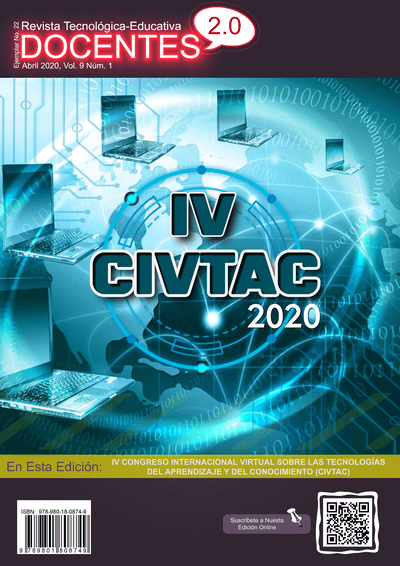Análisis de la aplicación de la teoría cognitiva de Jerome Bruner como mecanismo para fortalecer la conducta ambiental en los estudiantes del Grado Segundo de la Institución
 DOI:
https://doi.org/10.37843/rted.v9i1.110
DOI:
https://doi.org/10.37843/rted.v9i1.110
Contenido principal del artículo
Resumen
La presente investigación tuvo como objetivo el análisis de la aplicación de la Teoría Cognitiva de Jerome Bruner como mecanismo para fortalecer la conducta ambiental en los estudiantes del grado segundo de la Institución Educativa Chuniza. Para tal efecto se realizó una revisión bibliográfica sobre los aspectos relevantes de la mencionada teoría, así como de los trabajos en ámbito internacional, nacional aun regional, los cuales fueron de gran utilidad para el diseño metodológico, el planteamiento de la estrategia más el análisis de los resultados. El tipo de investigación fue cualitativo con meto Investigación -Acción, el cual partió de una etapa de diagnóstico donde se logró establecer que los estudiantes mencionados requerían fortalecer su conducta ambiental, toda vez que su desconocimiento de conceptos, impacto del hombre sobre la naturaleza la disposición final de residuos sólidos, entre otros, se hizo evidente. Con base en lo anterior, se diseñó una estrategia didáctica utilizando elementos lúdicos, musicales, teatrales incluso poéticos; aspectos que a la postre resultaron muy efectivos, pues se evidenció dinamismo en el desarrollo de cada actividad, análisis inferencial bien crítico de cada situación ambiental en particular y reflexión profunda sobre las causas y consecuencias del fenómeno ambiental actual, así como la creación de compromisos que a la postre servirán como ejemplo para el trato que se dé a tan álgida temática.
Descargas
Métricas
Detalles del artículo

Esta obra está bajo una licencia internacional Creative Commons Atribución-NoComercial-SinDerivadas 4.0.
Aquellos autores que tengan publicaciones en nuestra revista aceptan los términos siguientes:
- En el momento en que una obra es aceptada para su publicación, el autor conserva los derechos de reproducción, distribución de su artículo para su explotación en todos los países del mundo en el formato proporcionado por nuestra revista, así como en cualquier otro soporte magnético, óptico y digital.
- Los autores conservarán sus derechos de autor y garantizarán a la revista el derecho de primera publicación de su obra, el cual estará simultáneamente sujeto a la Licencia de reconocimiento de Creative Commons (Attribution-NonCommercial-NoDerivatives 4.0 International (CC BY-NC-ND 4.0)) que permite a terceros copiar y redistribuir el material en cualquier medio o formato, Bajo las condiciones siguientes: Reconocimiento — Debe reconocer adecuadamente la autoría, proporcionar un enlace a la licencia e indicar si se han realizado cambios. Puede hacerlo de cualquier manera razonable, pero no de una manera que sugiera que tiene el apoyo del licenciador o lo recibe por el uso que hace. NoComercial — No puede utilizar el material para una finalidad comercial. SinObraDerivada — Si remezcla, transforma o crea a partir del material, no puede difundir el material modificado. No hay restricciones adicionales — No puede aplicar términos legales o medidas tecnológicas que legalmente restrinjan realizar aquello que la licencia permite.
- Los autores podrán adoptar otros acuerdos de licencia no exclusiva de distribución de la versión de la obra publicada (p. ej.: depositarla en un archivo telemático institucional o publicarla en un volumen monográfico) siempre que se indique la publicación inicial en esta revista.
- Se permite y recomienda a los autores difundir su obra a través de Internet (p. ej.: en archivos telemáticos institucionales, repositorios, bibliotecas, o en su página web), lo cual puede producir intercambios interesantes y aumentar las citas de la obra publicada.
- El retiro de un artículo se solicitará por escrito al Editor, haciéndose efectivo luego de respuesta escrita de este. Para tal efecto, el o los autores enviarán correspondencia vía E-mail: [email protected].
- El autor no recibirá compensación económica por la publicación de su trabajo.
- Todas las publicaciones de la Revista Docentes 2.0, están bajo la plataforma Open Journal System (OJS) en dirección: https://ojs.docentes20.com/
Citas
Axelrod, L. J., & Lehman, D. R. (1993). Respondiendo a la preocupación ambiental: ¿Qué factores guían la acción individual? Revista de psicologia ambiental, 149-159.
Conpes (2014). Sistema General de Participaciones Vigencia. https://colaboracion.dnp.gov.co/CDT/ Conpes/Social/175.pdf
Corraliza, J., Berenguer, J., Moreno, M., & Martin, R. (2009). La investigación de la conciencia ambiental. Un enfoque psicosocial. https://www.juntadeandalucia.es/medioambiente/web/Bloques_Tematicos/Publicaciones_Divulgacion_Y_Noticias/Documentos_Tecnicos/personas_sociedad_y_ma/cap7.pdf
Cuello, A. (Marzo de 2003). Problemas ambientales y educación ambiental en la escuela. http://www.mapama.gob.es/es/ ceneam/ articulos-de-opinion/2003_03cuello_tcm7-53015.pdf
Gomera, A. (2008). La conciencia ambiental como herramienta para la educación ambiental: conclusiones y reflexiones de un estudio en el ámbito universitario. http://www.mapama.gob.es/en/ceneam/articulos-de-opinion/2008_11gomera1_tcm11-141797.pdf
González, A. (2003). Medio ambiente y participación, una perspectiva desde la psicología ambiental y el derecho. En C. San Juan, J. Berenguer, & J. Corraliza, Un modelo psicosocial de preocupación ambiental. Valores y creencias implicados en la conducta ecológica. (págs. 55-64). Bilbao: Servicio editorial de la Universidad del País Vasco.
Guilar, M. (2009). Las ideas de Bruner: De la revolución cognitiva a la revolución cultural”. http://www.scielo.org.ve/scielo.php?pid=S1316-49102009000100028&script=sci_arttext
Hernández, R., Fernández, C., & Baptista, P. (2010). Metodología de la investigación. Mc Graw Hill.
Hernández, R., Fernández, C., & Baptista, P. (2014). Metodología de la Investigación. Mc Graw Hill.
Marín, L. (2012). Problemática Ambiental. http://www.eco-index.org/search/pdfs/194report_2.pdf
Parra, H. (2013). Generando conciencia ambiental en niños y jóvenes de la Institución Educativa la fuente de Tocancipa para rescatar y preservar el ambiente que nos queda. http://bdigital.unal.edu.co/11499/1/01186767.2013.pdf
Pasek, E. (Marzo de 2004). Hacia una conciencia ambiental. https://www.redalyc.org/pdf/356/35602406.pdf
Pozzo, J. (2006). Teorías cognitivas del aprendizaje. Morata.
Puertas, S. (2009). Psicología ambiental. http://www4.ujaen.es/~spuertas/Private/Tema%209.pdf
Rodríguez, E., & Larios, B. (2009). Teorías del Aprendizaje del conductismo radical a la teoría de los campos conceptuales.
Rodríguez, G., Gil, J., & Garcia, E. (1996). Metodología de la investigación cualitativa. Aljibe.
Romero, C. (2005). La categorización un aspecto crucial en la investigación. http://aprendeenlinea.udea.edu.co/lms/moodle/file.php/727/la_ categorizacion_un_aspecto_crucial_en_la_investigacioncualitativa.pdf
Stern, P. (2000). Nuevas teorías ambientales. Hacia una teoría coherente del comportamiento ambientalmente significativo. Revista de asuntos sociales.
Suárez, I. (1 de Abril de 2016). Conducta ambiental responsable en estudiantes de secundaria. http://vinculando.org/ecologia/conducta-ambiental-responsable-estudiantes-secundaria.html






